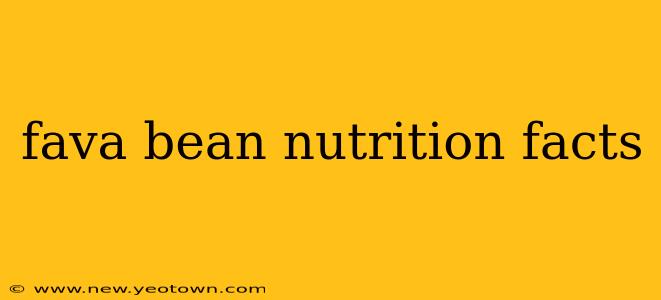Fava beans, also known as broad beans, are a nutritional powerhouse packed with history and flavor. These legumes, cultivated for millennia, have graced tables across the globe, offering a delightful and healthy addition to various cuisines. But beyond their culinary appeal lies a wealth of nutritional benefits that deserve a closer look. Let's embark on a journey to uncover the fascinating world of fava bean nutrition.
What are the Nutritional Benefits of Fava Beans?
Fava beans are an excellent source of dietary fiber, protein, and various essential vitamins and minerals. Imagine a humble bean contributing significantly to a balanced diet! One cup of cooked fava beans provides a substantial amount of:
- Protein: A crucial component for building and repairing tissues, essential for growth and development. Fava beans are a valuable source of plant-based protein, making them ideal for vegetarians and vegans.
- Fiber: This digestive superhero aids in regularity, promotes gut health, and contributes to feelings of fullness, potentially aiding in weight management.
- Folate: Essential for cell growth and development, particularly important during pregnancy.
- Iron: Plays a vital role in oxygen transport throughout the body. While the iron in plant-based sources like fava beans is not as readily absorbed as in animal sources, combining them with vitamin C-rich foods can enhance absorption.
- Manganese: Contributes to bone health, metabolism, and wound healing.
- Magnesium: Essential for muscle function, nerve transmission, and blood sugar control.
- Potassium: Important for maintaining healthy blood pressure.
- Copper: Plays a role in iron absorption and energy production.
- Phosphorus: Contributes to bone health and energy production.
- Vitamins B1, B6, and K: All play diverse and essential roles in maintaining overall health.
Are Fava Beans Good for Weight Loss?
The high fiber content in fava beans contributes significantly to feelings of satiety, which can aid in weight management. The fiber absorbs water, expanding in the stomach and promoting a sense of fullness, reducing overall calorie intake. This, combined with the protein content, makes them a satisfying and healthy addition to a weight-loss diet. However, it's crucial to remember that weight loss is a multifaceted process involving a balanced diet and regular exercise, not just one food.
What are the Potential Health Risks of Eating Fava Beans?
While generally safe, fava beans can pose a risk to individuals with a rare genetic disorder called favism. This condition causes a severe reaction to the bean's vicine compounds, leading to hemolytic anemia. Individuals with favism should strictly avoid consuming fava beans. Furthermore, like other legumes, fava beans can cause gas and bloating in some people due to their high fiber content. Starting with small portions and gradually increasing intake can help minimize these digestive issues.
How Many Fava Beans Should I Eat Per Day?
There's no magic number for daily fava bean consumption. As with most foods, moderation is key. Including them as part of a balanced and varied diet, alongside other fruits, vegetables, and whole grains, is recommended. Listen to your body and adjust your intake accordingly. If you experience digestive discomfort, reduce your consumption.
How Can I Incorporate Fava Beans into My Diet?
Fava beans are incredibly versatile! They can be enjoyed in various ways:
- As a side dish: Simply boiled or steamed.
- In salads: Adding a boost of protein and texture.
- In dips and spreads: Pureed into hummus-like creations.
- In soups and stews: Adding heartiness and flavor.
- As a standalone meal: Roasted with herbs and spices.
The possibilities are endless! Experiment with different recipes and find your favorite ways to enjoy this nutritious legume.
Are Fava Beans Good for Diabetics?
Fava beans have a moderate glycemic index (GI), meaning they don't cause a rapid spike in blood sugar levels. Their high fiber content also helps regulate blood sugar absorption. However, it's crucial for diabetics to monitor their blood sugar levels after consuming fava beans and adjust their overall diet accordingly, consulting with a healthcare professional or registered dietitian for personalized guidance.
This exploration of fava bean nutrition reveals the humble legume’s significant contribution to a healthy lifestyle. From aiding in weight management to providing a boost of essential nutrients, fava beans deserve a prominent place in your culinary repertoire. However, remember to be mindful of potential risks and always consult a healthcare professional if you have concerns about incorporating them into your diet.

